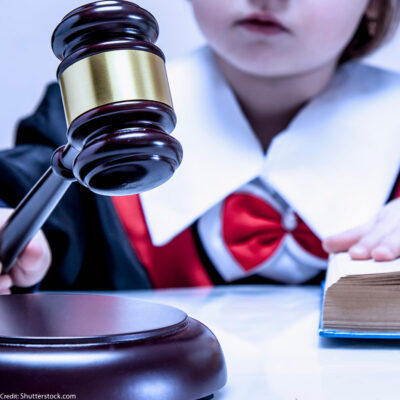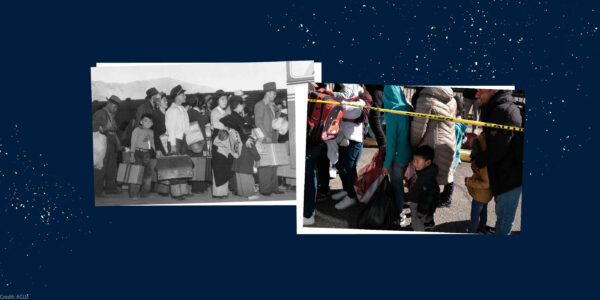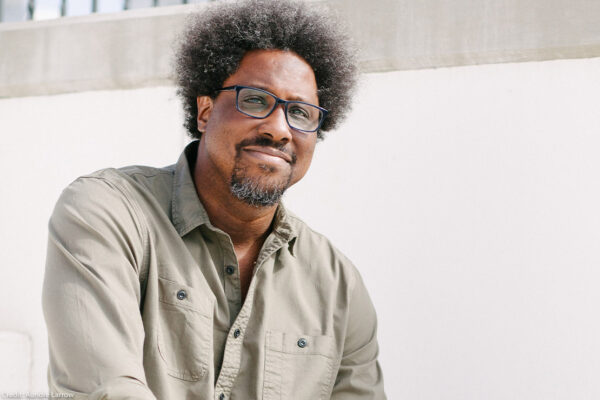At Liberty Podcast

At Liberty Podcast
ACLU Kids on How They’d Change The World with W. Kamau Bell
December 30, 2024
In this fourth annual year-end holiday edition of our series, the kids of ACLU staff take over the mic to share their big ideas for a better world. From what they’d do as president to how their parents are making a difference every day, these young voices offer fresh perspectives on the work of the ACLU and inspire us all to imagine a brighter future.
In this episode
This Episode Covers the Following Issues
Related Content
- Press ReleaseJul 2025

Immigrants' Rights
Human Rights
President Trump’s Visit To “alligator Alcatraz” Detention Facility Highlights Florida’s Descent Into State-sponsored Cruelty. Explore Press Release.President Trump’s Visit to “Alligator Alcatraz” Detention Facility Highlights Florida’s Descent Into State-Sponsored Cruelty
MIAMI — Following President Trump’s visit to the “Alligator Alcatraz” detention facility in Miami-Dade County. Bacardi Jackson, Executive Director of the ACLU of Florida, shared the following statement: “As President Trump doubled down on his agenda of fear and division, we’re reminded that this cruel and inhumane stunt is part of a broader strategy to expand the abusive mass detention machine, and in turn, criminalize and disappear members of our communities. Building a prison-like facility on sacred indigenous land in the middle of the Everglades is a direct assault on humanity, dignity, indigenous sovereignty, and the constitutional protections we all share. “Our laws — both U.S. and Florida — prohibit cruel and unusual punishment. Yet, this facility echoes some of our nation’s darkest history, all while trampling the very land that indigenous communities have long fought to protect. The facility’s opening also comes as Congress is poised to authorize $45 billion in funding to expand the harmful mass immigration detention machine, right on the heels of multiple deaths in detention facilities. This project dehumanizes people, strips them of their rights, and diverts public dollars from the services our communities need. “What the state is proposing is not a mandate — it is state-sponsored cruelty that would harm our neighbors, coworkers, and loved ones. We cannot stand by while Florida becomes a testing ground for policies rooted in racism, fear, and erasure.”Affiliate: Florida - Press ReleaseJun 2025

Human Rights
Aclu Responds To U.s. Absence From Human Rights Council Session On Political Interference In Education. Explore Press Release.ACLU Responds to U.S. Absence from Human Rights Council Session on Political Interference in Education
GENEVA – The United States today was absent from a presentation (starting at 2:25:05) at the United Nations Human Rights Council by Special Rapporteur on Education Farida Shaheed detailing her findings from a visit to the U.S. studying political interference in education. As part of her findings, Shaheed expressed concerns with the “authoritarian encroachment on universities, where state power is increasingly used to penalise dissent, shape curricula and restrict open inquiry.” The report also calls on the U.S. to uphold academic freedom, recognize education as a fundamental human right, end censorship and the politicization of content, promote assembly rights and academic freedom in the context of protest in support of Palestinian rights, and prioritize mental health over punitive discipline. Jamil Dakwar, director of the American Civil Liberties Union’s Human Rights Program, had the following reaction to the U.S.’ absence: "The United States’ decision to boycott today’s presentation by the U.N. expert on education to the Human Rights Council and her critical report on political interference in U.S. education, coupled with the continuing crackdowns on free speech and the autonomy of academic institutions, represents another dangerous low point in the Trump administration’s attack on basic human rights. “The White House’s disengagement with U.N. human rights mechanisms and attempts to force schools and universities to bend to the administration’s will ultimately risk the erasure of hard-fought achievements promoting equal and quality education, free speech, and academic freedom.” Under the Trump administration, the United States has disengaged with the Human Rights Council and other international institutions, and has launched one of the most abusive and aggressive assaults on human rights in U.S. presidential history - News & CommentaryMay 2025

Immigrants' Rights
Human Rights
George Takei: How The Alien Enemies Act Paved The Way For The Incarceration Of My Family. Explore News & Commentary.George Takei: How the Alien Enemies Act Paved the Way for the Incarceration of My Family
The actor and writer shares with the ACLU why he fears that, in Trump's America, history is repeating itself.By: George Takei - Press ReleaseApr 2025

National Security
Human Rights
Human Rights Advocates Sue Trump Administration Over Sanctions Targeting Icc. Explore Press Release.Human Rights Advocates Sue Trump Administration Over Sanctions Targeting ICC
WASHINGTON — Two U.S. human rights advocates are challenging the Trump administration’s executive order imposing sanctions on the chief prosecutor of the International Criminal Court (ICC). As the lawsuit explains, these sanctions violate the First Amendment by prohibiting the advocates, and other Americans like them, from speaking with the ICC’s Office of the Prosecutor, including by providing legal advice, expert analysis, and evidence. “The International Criminal Court is where victims of grave human rights violations turn when national legal systems fail to provide justice,” said Charlie Hogle, staff attorney with ACLU’s National Security Project. “Blocking our clients and others like them from doing their human rights work is unconstitutional.” Under the executive order, people in the U.S. who’ve devoted their lives to seeking justice for the victims of atrocities—like the genocide of Myanmar’s Rohingya people, or gender-based violence committed against Afghan women under the Taliban—could face stiff penalties simply for exercising their constitutional right to engage and advocate with ICC investigators and prosecutors. “Because of this order, I’ve been forced to stop helping the ICC investigate horrific crimes committed against the people of Myanmar, including mass murder, torture, and human trafficking,” said Matthew Smith, co-founder and CEO of Fortify Rights. “This Executive Order doesn’t just disrupt our work—it actively undermines international justice efforts and obstructs the path to accountability for communities facing unthinkable horrors.” Matthew Smith and Akila Radhakrishnan are suing because the executive order forced them to stop working with the ICC’s Office of the Prosecutor and indefinitely paused their efforts to hold leading rights violators accountable for horrific crimes. As the lawsuit explains, the First Amendment does not allow the government to impose such sweeping limits on what Americans can say, and to whom they can say it. “Victims of the Taliban’s oppression can’t rely on their own courts for justice. That’s why they turn to the ICC, and why it's so important for me to be able to partner with them in their fight for justice and accountability,” said Akila Radhakrishnan, an international human rights lawyer. “I’m bringing this suit to prevent my own government from punishing me for trying to hold the Taliban accountable for its systematic violence against women and girls from Afghanistan.” The international community, including the United States, established the ICC in 1998 to help maintain international peace and security. The ICC investigates and prosecutes crimes of the severest magnitude—including genocide, crimes against humanity, and war crimes—when domestic courts are unwilling or unable to do so. Today, 125 countries have joined the ICC’s founding treaty, known as the “Rome Statute.” As the lawsuit explains, although the United States has not ratified the Rome Statute, it has supported the ICC’s critical work on a wide range of matters. This lawsuit was filed in the United States District Court for the District of Maine by the ACLU and ACLU of Maine on behalf of Matthew Smith and Akila Radhakrishnan. In 2020, when President Trump imposed similar sanctions, the ACLU sued on behalf of human rights experts who were forced to stop working with the ICC. Our clients withdrew their lawsuit when President Joe Biden rescinded the sanctions, but a federal court in a separate suit agreed the sanctions likely violated the First Amendment.Affiliate: Maine
0:00
/0:01
0:01
